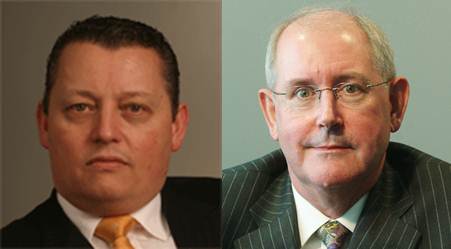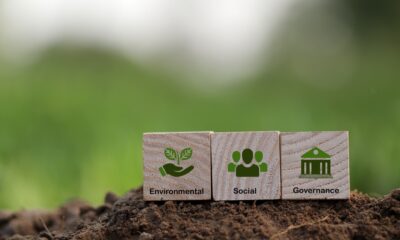

Features
FTSE’s ESG unit can “shed light” on responsible investment
Last week, the FTSE Group launched an environmental social governance (ESG) service unit, as it looks to assist the necessary shift towards a low-carbon economy. Blue & Green Tomorrow spoke with managing directors Kevin Bourne and Gordon Morrison about the newly-established unit’s premise.
In 2001, 17 years after the launch of its revolutionary FTSE 100 Index, the FTSE Group launched a series of indices that ranked companies on their environmental, ethical or socially responsible standard.
Over a decade later, and the FTSE4Good Index Series remains at the forefront of ESG reporting, and now, the Group has upped its efforts by launching an ESG service unit after strong demand from the investment community.
“We’re seeing a whole new phenomenon beginning to take place”, says Gordon Morrison, one of the managing directors of the service unit, “and that’s a combination of climate change, resource depletion, and environmental and biodiversity erosion.
“You can see the global policy makers and the politicians trying to grapple with all of these issues. These are being seen by asset owners and chief investment officers (CIO) as being potential risks in their portfolios.
The transition to the low-carbon economy is a very real and material industrial change.
“There’s industrial change happening, and the CIOs’ concern is that the industry lacks the tools or the framework against which it can measure and manage these risks.”
Morrison, who previously worked at HSBC, forms part of the unit’s management with Kevin Bourne and David Harris. Bourne, like Morrison, also spent some years at HSBC before moving to FTSE, and he told Blue & Green Tomorrow where the demand for an ESG
service unit emerged from.
“The management team at FTSE, and particularly the CEO Mark Makepeace, were very aware that this whole theme was expanding exponentially for a whole variety of reasons”, he explains.
“One of these was the realisation that these are real impacts now on the world and need to be addressed at a more substantial and technical level, and therefore Mark decided it was time to extend the company’s reach and technical capabilities.”
And so, the ESG service unit was launched last week. ESG was picked out as the prevailing definition of the theme so that customers could easily identify with it.
The installation of Morrison, Bourne and Harris as directors of the unit was something that FTSE saw as vital.
“From our experience, we understood that the challenge faced by the banks, fund managers and pension schemes, was the establishment of a framework that permitted disciplined integration of the green investment themes into their existing portfolios”, outlines Bourne.
“We provide sophisticated solutions that can be adopted by them so they can make well-educated investment decisions.
“There’s clearly a need to go beyond just providing the data products, and to deliver capabilities that help measure and model these issues for clients.”
The low-carbon economy is still at its very early stages. Conventional corporate social responsibility or socially responsible investment is relatively well understood and has been around for 15 years. However the consistent screening of ESG indicators is not as mainstream as some people would like to think, and not all fund managers apply it to all their products, all the time.
“The transition to the low-carbon economy is a very real and material industrial change”, he explains.

Kevin Bourne (left) and Gordon Morrison.
“How companies operate and what companies manufacture are two different issues. We focus on both, and look to provide sophisticated solutions that can be adopted by asset managers and exist within the operational regime that they live with day to day.”
One of the key processes of the service team, the pair say, is looking at which companies are actually adapting to, mitigating or remediating the effects of climate change, resource depletion and environmental and biodiversity erosion.
Some companies score very highly in ESG terms, but the products they’re creating are not contributing to an industrial change. On the other side of the coin, there are some companies that, on paper, may be marked poorly for ESG – usually because of the industry they are involved in – but sometimes, they are the ones actively striving for change.
Then there are companies that do well in both aspects: those that are high-scoring in ESG and are going to benefit from an industrial transition.
“Our frame of reference is the transition to the low-carbon economy, and we have a low-carbon economy optic that we apply to the way the world currently addresses the capital market’s definition of industrialisation”, says Bourne.
There needs to be investment on a massive scale in goods and services that are going to help mitigate and adapt to the problems that exist globally.
“From that, we’ve been able to create a framework that enables, we hope, the investment industry to understand the dynamics and the change that is taking place.
“Whilst there are good products to help understand when companies are starting to change their operating model – and the FTSE4Good index is a great example of this – it is the totality of the change that needs to be captured – that’s the work we did before we came to FTSE and the reason we’re here now – because fund managers need to be able to understand not just from an equities point-of-view how this change is impacting their portfolio, but also what’s happening to debt, commodity and property markets as a result of these changes.”
With FTSE’s ESG service unit only in its infancy, it remains to be seen as to how effective its operations will be. But one thing is for sure: there is a high demand for a service unit that focuses on environmental, socially responsible and sustainable investing.
“There are clear needs in the marketplace to help solve the problems that exist at a global scale”, concludes Morrison.
“There is a school of thought that says if we cannot sort out this global climate change risk, then temperatures are going to rise, water is going to become scarcer, there is going to be more flooding and society as we know it on a global basis will change very radically.
“There needs to be investment on a massive scale in goods and services that are going to help mitigate and adapt to it.
“It might be flood defence barriers, water desalination plants or more efficient generation of electricity, but whichever way, there needs to be massive investment into these new industries.
“I think that the ESG unit can shed some light onto how those investments could be directed.”
Ultimately, it’s companies that the FTSE service unit is targeting, but private investment in sustainable places is placed at equal importance. We urge you to take a look at our recent Guide to Sustainable Investment for information from industry leaders about how your own money can help inspire the all-important shift to a low-carbon, sustainable economy.
Further reading:
FTSE answers ESG demand with launch of new service unit
Investors worth $3 trillion call out corporate sustainability failures


 Environment12 months ago
Environment12 months agoAre Polymer Banknotes: an Eco-Friendly Trend or a Groundswell?

 Features11 months ago
Features11 months agoEco-Friendly Cryptocurrencies: Sustainable Investment Choices

 Features12 months ago
Features12 months agoEco-Friendly Crypto Traders Must Find the Right Exchange

 Energy11 months ago
Energy11 months agoThe Growing Role of Solar Panels in Ireland’s Energy Future





























